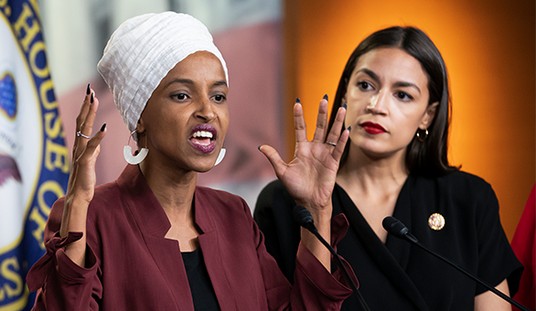Part 1: A Guided Tour Through Derrick Bell’s Afrolantica Legacies
Part 2: A ‘Euphoria of Freedom’
Part 3: What Could it Mean to Be White?
Part 4: The Wages of Antisemitism
Part 5: Thomas Jefferson, A Symbol of American Racism
Part 6: Why Meritocracy Must Die
Part 7: Unemployment Creates Crack Dealers
Part 8: We Have a Right to Your Property
Part 9: The Birth of ‘Blackness’
Part 10: Apocalyptic Prophet of Racial War?
Part 11: The Brown-Skinned Joan of Arc
Part 12: Critical Race Theory’s Distortion of Trayvon Martin
Part 13: The Roots of the War on Meritocracy
Part 14: The Marxist War Within the Multi-Racial Family
Part 15: The White Bourgeoisie Conspiracy to Dupe the Black Proletariat
Part 16: The Progressive Faith Vs The Jewish Faith
Following the long defense of Louis Farrakhan’s antisemitism in the previous chapter, Derrick Bell presents an essay illustrating the fourth Afrolantica Legacy, another of the dogmas in his political religion:
For his proletariat martyr Bell names one of the saints of the faith. His title: “Paul Robeson: Doing the State Some Service.”
Here’s an excerpt from page 111:

There’s something chilling about Bell arranging his chapters in this way. The previous essay “Shadowboxing: Blacks, Jews and Games Scapegoats Play” defended Louis Farrakhan and denied his antisemitism. Now in this chapter Bell holds up the Stalinist icon Paul Robeson as “one of our greatest heroes.”
Robeson too, had his own history of supporting lethal antisemitism. Wikipedia summarizes and even generously provides the justifications of Robeson’s defenders:
In June 1949, during the 150th anniversary celebration of the birth of Alexander Pushkin, Robeson visited the Soviet Union on a major tour including a concert at Tchaikovsky Hall. Concerned about the welfare of Jewish artists, Robeson insisted to Soviet officials that he meet with Itzik Feffer a few days earlier.[14] Robeson had first met Feffer on July 8, 1943, at the largest pro-Soviet rally ever held in the United States, an event organized by the Jewish Anti-Fascist Committee and chaired by Albert Einstein. Robeson then also got to know Solomon Mikhoels, the popular actor and director of the Moscow State Jewish Theater. Mikhoels also headed the Jewish Anti-Fascist Committee in the Soviet Union with Feffer as his second. After the rally, Robeson and his wife Essie had entertained Feffer and Mikhoels.
According to an account by Paul Robeson Jr told to Robeson biographer Martin Duberman,[15] in the 1980s, Robeson was disturbed as to why he could not find his many Jewish friends when he returned to the U.S.S.R. in June 1949. After several inquires, Feffer was brought to Robeson’s hotel room by the State Police. He and Feffer were forced to communicate through hand gestures and notes because the room was bugged. Feffer indicated that Mikhoels had been murdered in 1948 by the secret police[16] and intimated that he also was going to be killed. Feffer in fact was executed along with 14 other Jewish intellectuals three years later.[17]
…
Upon returning to the United States, he denied any persecution of Jews and other political prisoners, stating that he “met Jewish people all over the place… I heard no word about it.”[17] Historians Martin Duberman, Philip S Foner, Marie Seton, Paul Robeson Jr and Lloyd Brown concur that Robeson had a long standing mistrust of the US government and that he felt that criticism of the Soviet Union’s internal affairs by someone of his immense international popularity would only serve to shore up reactionary elements in the U.S. .[28] Robeson is on record numerous times as stating that he felt the existence of a major socialist power like the USSR was a bulwark against Western European capitalist domination of Africa, Asia and the Caribbean.
According to Joshua Rubenstein’s book, Stalin’s Secret Pogrom, Robeson also justified his silence on the grounds that any public criticism of the USSR would reinforce the authority of anti-Soviet elements in the United States which, he believed, wanted a preemptive war against the Soviet Union.[28] A large number of Robeson biographers, including Martin Duberman, Philip S Foner, Marie Seton, Paul Robeson Jr and Lloyd Brown also concur with Robeson’s own words, that he felt that criticism of the Soviet Union by someone of his immense international popularity would only serve to shore up reactionary elements in the U.S., the same elements that had lifted his passport, blocked anti-lynching legislation, and maintained a racial climate in the United States that also allowed Jim Crow, impoverished living conditions for all races and a white supremacist domination of the US government to continue.
And recall in the previous Afrolantica post, one of my translations of a statement by progressive Jews who Bell had quoted to try and mask his antisemitism: “Translation: defending the progressive faith is more important than defending the Jewish faith. When the two conflict, Jews should embrace the former.”










Join the conversation as a VIP Member